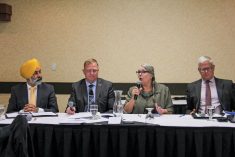Go to an agricultural event and someone will inevitably point out how bad farmers are at getting their message to consumers.
As annoying as it is, those comments underscore an increasingly important theme in Canadian agriculture: communication. It used to be enough to grow and market your crops, but that has changed dramatically over the last several years.
The impact of this is being felt in a real way — perhaps more now than in recent years.
People prefer to buy organic food, even if they can’t define what exactly the word means. Shoppers search the shelves for the container claiming to be “non-GMO” knowing little more than what the letters stand for. Actors take to the stage at awards shows denouncing an entire industry with little indication they have set foot on a dairy farm. High-ranking politicians warn of “extremists” holding protests generally denouncing an entire industry. Protestors halt railways to draw attention to a cause with little, if any, recognition of what’s in the stopped cars along the track.
Read Also

China seeks improved ties with Canada amid rising trade tensions
China called on Friday for steps to improve bilateral ties with Canada, saying there were no deep-seated conflicts of interest, following a spike in trade tensions with many of Beijing’s Western trade partners this year.
Consumers make some of those decisions because they have looked into the issues. Mostly, though, they do it because it feels like the right thing to do. For all of their clout in political circles, farm organizations have struggled to combat this.
Ironically, the failure can at least in part be attributed to the agriculture industry’s inability to abandon the facts.
Farmers and the organizations representing them make decisions based on evidence, logic and science. Consumers are making decisions on feelings and emotions.
Our state of public discourse in this modern era seems to be entirely online, conducted in explosions of a few sentences at a time. People bang away on keyboards driven by the emotions in their hearts rather than the information in their heads. Discourse is fragmented, and we’re all awash in information with, for the average person, little ability to distinguish what’s news, what’s marketing, and what’s downright wrong.
Informed public debate was once sacred, the goal of political discourse and the foundation of good decision-making. No longer. Politics has devolved into elected officials speaking in platitudes, talking a lot but saying little while trying to make people feel good about their actions.
The result of this post-truth world is having the displeasure of living in an age where we have never before had the means to be this connected to one another, but are left with an ever-growing divide between us. Friends and enemies, left and right, consumer and corporation.
Feelings, not facts.
It’s all kind of sad, but at least within agriculture there is a growing recognition of this.
And there are some great ideas on how to combat it, including one from Andrew Campbell.
He spoke at Farm Credit Canada’s Ag Day celebration in Ottawa recently, sharing with the crowd of 500 people why it is important for farmers to share their side of the story.
“To the consumer, our side of the story doesn’t exist unless we tell it,” he said, suggesting to the audience everyone in the industry should make an effort to explain to anyone who will listen why they are in agriculture.
“Just go out and be real, and be honest and be transparent. Because what I found, and I know a lot of other farmers have found in the past, is that, you know, just having that kind of emotional transparency into what we do and why we do it actually goes a long way.”
It’s a good point, grounded in optimism.
The agriculture industry should be commended for sticking to the facts. But farmers need to learn how to leverage those facts and tap into emotions. Until that happens, complaints about bad communication will persist.
— D.C. Fraser writes for Glacier FarmMedia from Ottawa.
















